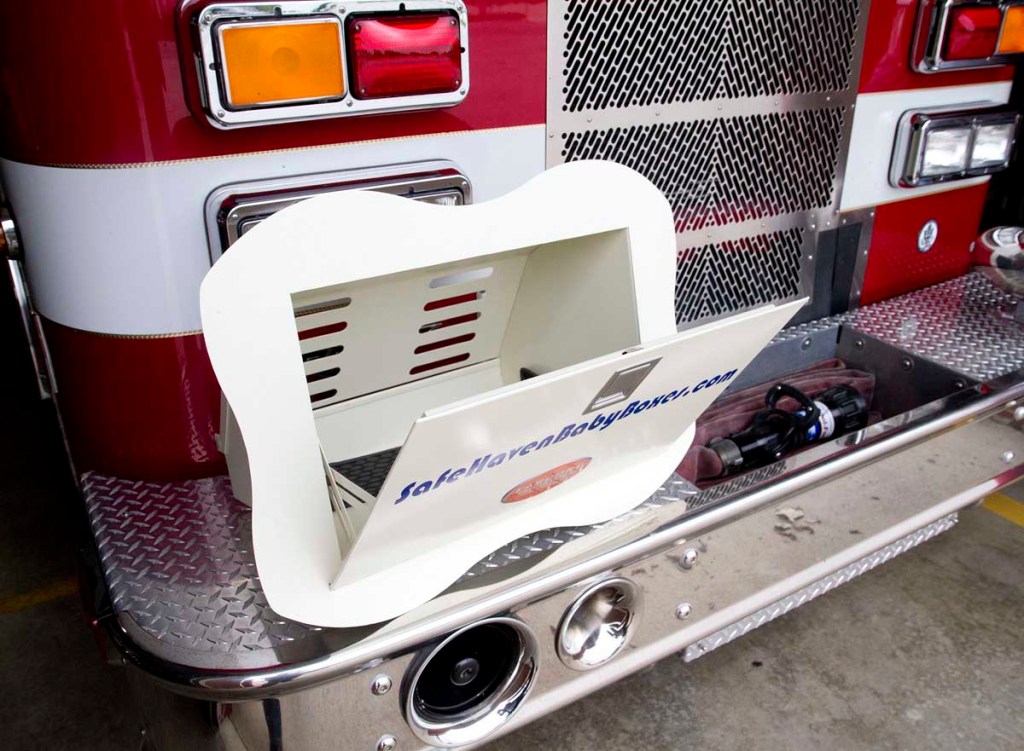‘Baby boxes’ seen as safe harbor for abandoned infants
Published 10:15 am Thursday, July 2, 2015

- The interior of a prototype of a baby box is shown here at the Woodburn (Ind.) Fire Department. The box is designed to allow a mother to surrender her newborn anonymously at a designated safe haven, such as a hospital or police or fire station. Indiana lawmakers must still approve rules for their legal use.
INDIANAPOLIS – Firefighter Monica Kelsey’s discovery that she was abandoned at birth may prompt Indiana to expand its safe-haven law aimed at protecting unwanted infants.
Kelsey is promoting use of a “baby box” – an incubator designed to serve as a kind of a safe and secure drop-box for a parent to anonymously surrender an infant.
Small in length and width, the boxes are meant to be installed outside of hospitals, fire stations and police stations – where emergency responders can quickly access an abandoned baby when built-in triggers are activated.
Such baby boxes are used in other countries, including South Africa, where Kelsey, 42, visited in 2013 after learning the circumstances of her own birth. Two hours after she was born, her frightened, unwed teenage mother – pregnant with her by rape — walked away from a small-town hospital without her.
“I knew how many babies our safe-haven laws have saved, but I wondered, ‘Why aren’t we doing even more in this country to save unwanted children?'” said Kelsey, a firefighter and medic in the small city of Woodburn near Fort Wayne.
Earlier this year, Kelsey lobbied lawmakers to change the state’s safe haven law to accommodate the use of the boxes through legislation filed by Rep. Casey Cox (R-Fort Wayne.)
She was partly successful. The General Assembly unanimously authorized a study of the incubators. And it directed the state Department of Public Health to recommend standards and protocols for their use.
Those efforts could allow the first boxes to be installed as soon as next year, making Indiana the first state to use them.
Like every other state, Indiana already has a law allowing a parent to abandon a newborn.
A parent may relinquish custody of a child less than 30 days old at designated safe havens without fear of prosecution if the baby shows no signs of physical harm. Safe locations include fire stations, police stations and hospitals.
At least 25 babies been surrendered in Indiana since 2008, according to the state Legislative Services Agency. Nationally about 2,800 babies have been abandoned under the blanket of similar laws since the first one passed in 1999.
But safe-haven laws aren’t a panacea. The Chicago-based Abandoned Babies Foundation says 1,400 infants were abandoned illegally in the wake of the first safe-haven laws, with two-thirds of them found dead.
Last December, a day-old infant was found dead at an Indianapolis park, just a few blocks from a fire station.
That tells Kelsey and other baby-box supporters that some women are still afraid and ashamed.
“They can’t bring themselves to hand over their babies to someone, even when they can just walk away,” said Rep. Ron Bacon, R-Boonville, a former county coroner who’d seen the problem first-hand.
Kelsey is convinced the baby boxes can mitigate some of that fear by providing more anonymity.
“I’m a firefighter in a small town,” she said. “If some girl walked into our department with a baby, I guarantee I’d know her and her parents and probably every member of her family. I don’t want something like that to get in the way of saving that baby.”
Still, baby boxes have come under criticism. In 2012, amid a rise in their use in Europe, members of the United Nations Committee on the Rights of the Child called for baby boxes to be banned.
Their argument is that baby boxes violate a child’s right to know who its parents are. And they argue that pregnant women should have access to the medical and economic resources that could prevent them from having to take such a drastic measure as abandoning a child.
Dawn Geras, president of the Save the Abandoned Babies Foundation, doesn’t support Indiana’s move toward the use of baby boxes.
She’d rather see expanded efforts to promote the current safe haven law, which she says gives frightened mothers an opportunity to interact with someone who can help.
“The problem with every state safe haven law is that most people don’t even know they exist,” Geras said. “I can’t believe in my heart and mind that there are many women out there who think, ‘I’ll just discard my baby.’
“Their babies need our help,” she said. “But these mothers need our help too.”
Maureen Hayden covers the Indiana Statehouse for CNHI’s newspapers and websites. Reach her at mhayden@cnhi.com. Follow her @MaureenHayden





